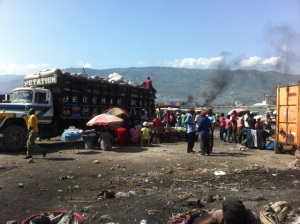8/28/13 – Stories From the Field: This guest post is written by Carl Husen, member of the Epri-Sel team, which is developing a local salt production venture in Haiti. Carl is in his final semester of the Global Social and Sustainable Enterprise MBA program. Read their original post here.
During our time in Haiti, and especially while visiting the informal distribution hubs of Warf Jeremie and Cite Soleil, we have uncovered serious challenges facing small business owners as they distribute products throughout the country. As a larger producer with the support of local aid organizations, we have the capacity to overcome some of these challenges. We have discovered we can compete on price, but now we need to determine if our decision to enter the market with our salt will significantly hinder smaller producers’ abilities to earn a living.
We first wanted to look at the informal market to determine if we could in fact compete. We conducted research in over twenty open-air markets in the Port au Prince area, as well as along the road to Gonaives in the north. We have discovered that the price of salt changes, sometimes varying by as much as two-three times. The good news is, even at the lowest price we can compete. However, the distribution channels currently in use are less than ideal. The road from Gonaives (where production takes place) to Port au Prince (where salt is sold) is long and treacherous. The other option – overwater transportation – can be even more expensive and is dependent on having fair weather as the boats used for transportation are very small and are barely be held together.
Two elements are working in our favor: 1) The road from Gonaives is under construction and will most likely be completed in the coming years; and 2) We have a contract with a boat builder in Port au Prince that is building us a boat specifically for transporting our salt safely and efficiently. Both these factors will greatly increase our margins as we anticipate distribution costs to decrease. Now comes the difficult question: How will this move affect the independent salt producers?
Many of us have seen how well meaning aid applied incorrectly can hinder a local economy’s ability to thrive. Would we be doing the same thing here? Because of this very question we have also started looking at other options in which our product is exported to the US and sold in boutique spice shops with a significant markup. The profits from our “Salt with a Story” would return to the communities where it is produced and can then be used in whatever manner the community wishes. Over this final semester, our team will continue to explore both options, taking all stakeholders into account to find the best way forward.




